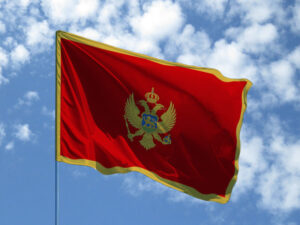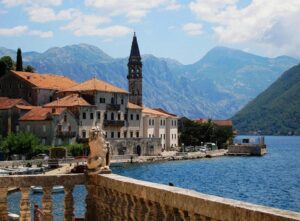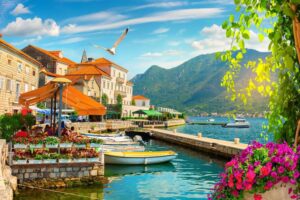
According to the Serbian Economist, Montenegro will soon tighten the visa regime for Russian citizens, bringing it in line with the rules of the European Union. This was announced by the Prime Minister of the country Milojko Spajic.
According to the head of the government, Podgorica intends to fully harmonize visa policy with the EU, which means the abolition of the current order allowing Russians to stay in Montenegro up to 30 days without a visa. Spajic emphasized that the measures will be introduced “very soon” and are part of the course to accelerate European integration and achieve EU membership by 2028.
Russian citizens can now freely enter the country for short periods of time without a visa, which has led to a significant increase in the number of tourists and re-locations from Russia in recent years. Once the regime is tightened, entry will require a visa at consular offices, similar to Schengen rules.
How many Russians now reside in Montenegro
According to official data from the Ministry of Internal Affairs of Montenegro, at the beginning of 2024-2025 in the country officially registered about 20 thousand citizens of Russia with a temporary or permanent residence permit. This makes Russians one of the most numerous foreign communities in the small 600-thousand-strong state.
In addition, according to the calculations of tourism and migration services, several thousand more Russians are in the country without long-term statuses – on tourist stay, on business grounds or in the process of registration of residence permits.
Prime Minister also recalled that Montenegro had previously tightened visa rules for citizens of Armenia, Uzbekistan, Kuwait and Egypt within the framework of adapting visa policy to EU standards. Podgorica fully follows the general foreign and defense policy of the European Union, including sanctions and visa restrictions against Russia.
Observers attribute the upcoming changes to pressure from Brussels following the tightening of the EU visa regime for Russians, as well as Montenegro’s desire to reaffirm its commitment to the European course against the backdrop of membership negotiations.
https://t.me/relocationrs/1792

As reported by the Serbian Economist, the Government of Montenegro at a meeting of the Council of National Security approved a package of measures to tighten migration policy, including a proposal to fix in the Law on Foreigners the minimum value of real estate € 200 thousand as a basis for granting temporary residence. This is stated in the official message of the Cabinet of Ministers.
Among other decisions of the Council is the instruction to the Ministry of Foreign Affairs to prepare amendments to the decree on visa regime, which will reduce the period of visa-free stay for citizens of countries not aligned with the EU visa policy from 90 to 30 days. The Council also ordered that data on dormant and inactive foreign-owned companies be handed over to the police for verification and possible revocation of previously issued residence permits.
The government notes that the “company for the sake of a residence permit” ground is planned to be replaced by the requirement of full employment with a registered employer or an established company. At the same time, local media specify that the Parliament has introduced amendments, according to which the extension of residence permit for the founder of the company will be possible if there are at least three full-time employees, of which at least one Montenegrin citizen, and the extension of residence permit for real estate will depend on its value and size. These norms are to be detailed in bylaws.
Podgorica emphasizes that the measures are aimed at aligning the rules with EU approaches and strengthening control over migration flows. The final changes will require the adoption of amendments to the law and bylaws.
https://t.me/relocationrs/1698

According to Serbian Economist, following a meeting of the National Security Council, the Montenegrin government announced that it was preparing amendments to the Law on Foreigners, which would abolish the requirement to obtain a residence permit on the basis of ownership of a “dormant” or formal company and linking the right to reside to full-time employment with a registered employer or a newly established company with contributions and salaries above the minimum. This is stated in a government announcement.
According to the government, interagency checks on the migration and economic activity of foreigners are being tightened; owners of inactive companies in foreign ownership will have their right to reside terminated.
At the same time, the authorities are preparing to restrict visa-free short-term stays for citizens of countries that are not in line with EU visa policy from 90 to 30 days. The authorities have been instructed to prepare subordinate legislation based on the new criteria.
In Montenegro, it has long been possible to open a company and, on this basis, obtain and extend a residence permit; the authorities say it is necessary to close down “schemes” of fictitious employment and bring the rules into line with European standards. In public discussions, it is noted that the “1 euro company” regime should not apply to foreigners.
The greatest risks are faced by foreigners who have obtained a residence permit through their own companies without real activity or without full-time employees and payment of contributions.
In terms of business structure and residents, company owners from Turkey, Russia, Serbia, and Ukraine are in the lead; they will be the first to feel the requirements for real employment and tax payments.
According to open estimates, Turkish citizens own about 9,800 companies, Russians about 7,200, and Serbs more than 3,200; in total, there are more than 31,000 foreign companies in the country.
The geography and main risk groups are as follows:
1) Turkey – the largest group of company owners; in addition, according to police data, more than 13,000 Turkish citizens have a residence permit or a residence permit + work permit. There is a risk of losing status in the absence of real employment and contributions.
2) Russia – second in terms of the number of companies and one of the largest groups of residents; “paper” companies are at increased risk of having their residence permits revoked.
3) Serbia – a significant group in terms of residence permits and companies; formal structures without employees will also be subject to checks.
4) Ukraine – a noticeable share of company owners; formal companies without turnover and employees are under special scrutiny.
The exact parameters will be determined by amendments to the law and subordinate acts.
Source: https://t.me/relocationrs/1694

A week-long program for a group of children from the Zaporizhzhya region of Ukraine has started in Kotor, Montenegro. According to Boka News, 36 children arrived in the city, many of whom lost their parents to the war. The visit was agreed between Kotor Mayor Vladimir Jokic and Ukrainian Ambassador to Montenegro Oleg Gerasimenko. The program is scheduled for November 3-10.
At the reception in the Bisanti Chamber, the mayor welcomed the children and said that a cultural and educational itinerary has been prepared for them: a walk through the Old Town and a visit to the Maritime Museum, a trip to Perast and a boat trip on Boka Kotorska Bay, as well as meetings with peers in local schools. A climb of the city walls, a day trip to Lovcen and a vacation on Plavi Horizonte beach are planned.
The teachers accompanying the group thanked the residents and authorities of Kotor for their hospitality, noting the importance of emotional relief and safety for the children. Publications in local media and social networks specify the number of the group and dates of stay

According to Serbian Economist, the Montenegrin government has submitted amendments to the law on foreigners to parliament, which provide for stricter conditions for granting temporary residence and work permits. The aim is to link the extension of stay to the financial capacity of applicants and their real economic contribution.
According to the government’s explanations, the extension of temporary residence for property owners is planned to be linked to the cost and area of the property, and for company founders and directors – to confirmation of actual activity and payment of taxes. Closer coordination between the Ministry of Internal Affairs and other agencies and international organizations is expected. The bill was supported by the relevant committee without any votes against, and the document will now be considered by the Skupština.
Context: Against the backdrop of a growing number of foreigners in 2024-2025, the government expanded electronic procedures and special statuses (in particular for digital nomads), while gradually raising the economic criteria for residence. After the first reading, subordinate legislation is expected to be introduced with methods for assessing real estate and verifying the economic activity of companies. Specific thresholds — the cost and area of housing, minimum tax indicators — will be announced separately.
According to the Ministry of Internal Affairs, as of September 10, 2025, there are 100,867 foreigners living in the country: 71,250 with temporary residence and 29,617 with permanent residence.
The structure of temporary residence is dominated by citizens of Serbia, Russia, and Turkey; approximately 24,538 Serbs, 21,153 Russians, and 13,396 Turks.
In the first 11 months of 2024, 65,895 permits for temporary or permanent residence and work were issued.
As of June 1, 2024, nearly 5,000 Ukrainian citizens were under temporary protection; in 2025, 5,463 applications for renewal and 2,006 new applications were recorded.
Since the temporary protection regime came into force on March 11, 2022, 13,034 applications have been submitted, of which 12,302 have been approved (as of January 13, 2025).
Between January and August 2025, 69,826 Ukrainian citizens entered the country and 67,561 left; since the start of the full-scale war until January 13, 2025, 293,414 entered and about 292,500 left. Some Ukrainians are staying for other reasons (short-term, temporary, or permanent residence).
Source: https://t.me/relocationrs/1681
After a nighttime incident in Podgorica, where a group of Turkish citizens stabbed a local resident during a conflict, the government of Milojko Spajić announced a temporary suspension of the visa-free regime for Turkish citizens—a political signal that security and entry controls take priority over previous openness (visa-free travel had been in place since 2008). The decision was confirmed by leading international media and government sources, which record both the incident itself and the authorities’ response formula—“a temporary pause + a rules review,” with the prospect of further consultations with Ankara on a new visa regime.
According to police reports, after a weekend marked by tension in the capital, several dozen foreigners—primarily citizens of Türkiye and Azerbaijan—were detained; President Jakov Milatović publicly called for calm and condemned retaliatory attacks on Turkish citizens and their property. This set of actions—stepped-up patrols, selective checks of legal stay, and preventive detentions—aligns with the logic of a “rapid stabilization” of order following stabbing incidents.
The socio-political backdrop has sharpened: anti-Turkish slogans were heard on the streets of Podgorica, and acts of vandalism were recorded—in particular, a business owned by a Turkish citizen in the city center was trashed, and a Turkish owner’s car was set on fire. These episodes heighten the risk of “collective responsibility,” when a single criminal offense triggers a chain of xenophobic reactions that harm people’s safety and the business climate.
The interstate dimension is developing in parallel: Türkiye’s foreign ministry promptly reached out to the Montenegrin prime minister and security officials, insisting on guarantees of rights and protection for Turkish citizens; Podgorica, for its part, declares “intensive consultations” with Ankara to find a model that combines public safety with continued economic interaction. This means that the “pause” in visa-free travel is not only a punitive gesture but also an instrument for reformatting access rules: new forms of short-term visas, mandatory registration procedures, or higher criteria for business visitors are possible.
The economic projection of the situation is ambiguous. Turkish business in Montenegro is a notable player in trade, hospitality, and real estate, especially along the Adriatic coast; rolling back visa-free travel will almost certainly reduce the mobility of entrepreneurs and workers, complicate seasonal planning, and slow transactional processes. Estimates of the size of the Turkish community vary: a number of sources cite roughly 13.3 thousand officially resident Turkish citizens (which is higher than the 2–3 thousand estimates mentioned in some materials), and for this group a clear, predictable procedure for extending stays and conducting business is crucial to avoid an outflow of investment and a “cooling” of employment in tourism and services.
At the domestic political level, the authorities’ decision serves several functions at once: it demonstrates control and sensitivity to the demand for security; cuts off the argument about “open gates” for offenders; and simultaneously mitigates reputational risks vis-à-vis the EU, with which Montenegro is negotiating membership, by aligning migration regimes and public-order standards with European practice. However, excessive “toughness” without simultaneously restraining xenophobia may provoke an escalation of ethnic tension and inflict long-term damage on the country’s investment image—this is precisely why the president’s message about the inadmissibility of attacks on Turks is a systemically important marker of balance.
From this follow the near-term scenarios. The first is “controlled thawing”: after stabilization and de-escalation of violence, and after technical parameters are agreed with Ankara, Podgorica restores simplified entry in an updated format (for example, through mandatory declarations of travel purpose or expedited category-based visas for investors and workers). The second is a “long pause”: the visa regime becomes entrenched, criteria for verifying the very purpose of entry and the legality of stay grow stricter, and Turkish companies’ business processes become costlier and slower, with a risk of investment being reallocated to neighboring jurisdictions. The third is “social turbulence”: if law-enforcement response to anti-Turkish pogroms is unsystematic, public sentiment will radicalize, and even a properly calibrated visa filter will not compensate for the loss of investor and tourist confidence. At present, government communications—about consultations with Türkiye and safeguarding public order—indicate that the bet is on the first, compromise path.
In summary, Montenegro’s decision to suspend visa-free travel is a system-level “alarm signal”: the authorities are simultaneously extinguishing a situational security crisis and trying to revise the architecture of migration procedures according to standards of control and predictability. However, the sustainability of this course will be determined not only by the strictness of border filters, but also by the state’s ability to protect lawful residents and entrepreneurs from collective punishment, hold perpetrators accountable, and preserve channels of economic cooperation with Türkiye—a partner that is already demanding security guarantees for its citizens and is ready to negotiate new rules of the game.
CRIME, INVESTMENTS, MONTENEGRO, PODGORICA, PUBLIC SENTIMENT, TURKEY